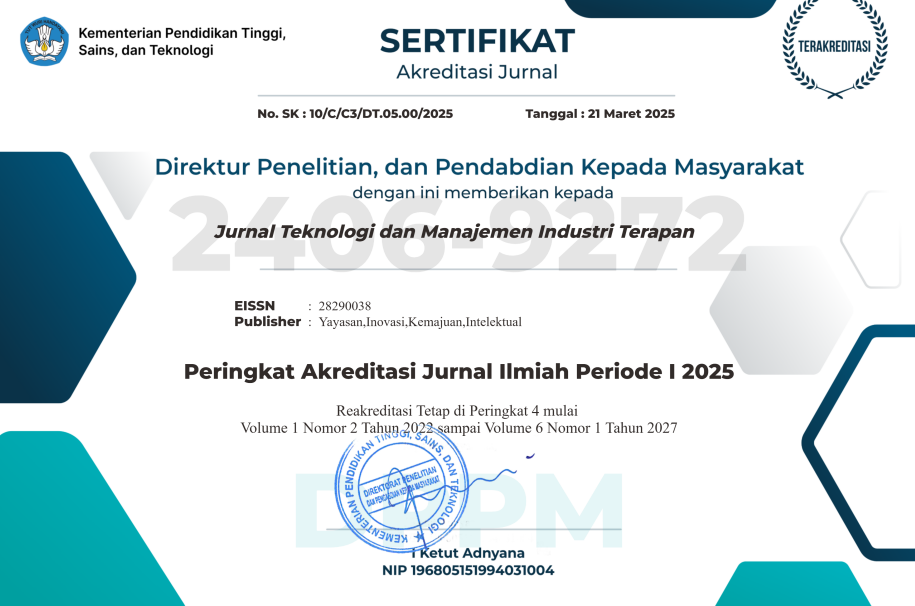Work Environemnt As A Moderating Variable Of The Influence Of Work Facility On Employee Performance
DOI:
https://doi.org/10.55826/jtmit.v4i2.1198Keywords:
Work Environment, Work Facility, Employee PerformanceAbstract
This research is a quantitative research with an explanatory approach, namely an approach that makes previous research the main support for building, modifying, or adding to, and proving the hypotheses in this article. The data used in this research is primary data that the researcher obtained from one hundred lecturers and educational staff at STIKES Muhammadiyah Bojonegoro. The data obtained by the researcher was analyzed using the smart PLS 4.0 analysis tool. The result in this article shows that the Work Facilities variable can have a positive and significant influence on the Employee Performance variable because the P-Values are positive and below the significance level of 0.05, namely 0.025. These results are in line with the research. These results indicate that Work Facilities can facilitate Employee Performance, make work results more qualified, and ultimately improve Employee Performance. In addition, the Work Environment variable can also moderate the influence of the Work Facilities variable on the Employee Performance variable because the same thing is that the P-Values are positive and below the significance level of 0.05, namely 0.000, more significant than direct testing. Thus, a good work environment that supports employees in working, accompanied by Work Facilities, can significantly influence Employee Performance.
References
Veithzal Rivai Zainal, Manajemen Sumber Daya Manusia untuk Perusahaan: dari teori ke praktik. Jakarta: Rajawali Press, 2015.
Nawawi, Manajemen Sumber Daya Manusia untuk Bisnis yang Kompetitif. Yogyakarta, 2001.
P. Afandi, Manajemen Sumber Daya Manusia. Yogyakarta: Nusa Media, 2018.
E. R. Lestari and N. K. F. Ghaby, “The Influence of Organizational Citizenship Behavior (OCB) on Employee’s Job Satisfaction and Performance,” Ind. J. Teknol. dan Manaj. Agroindustri, vol. 7, no. 2, pp. 116–123, 2018, doi: 10.21776/ub.industria.2018.007.02.6.
T. Maryati and A. Fernado, “Peran Organizational Citizenship Behaviour (OCB) Dalam Memediasi Pengaruh Motivasi Intrinsik dan Kepuasan Kerja Terhadap Kinerja Karyawan pada PT.Cinemaxx Branch Lippo Plaza Yogyakarta,” JBTI J. Bisnis Teor. dan Implementasi, vol. 9, no. 2, pp. 158–173, 2018, doi: 10.18196/bti.92107.
Danang Saputro, “PENGARUH KEPUASAN KERJA TERHADAP KINERJA KARYAWAN PT. DUREN MANDIRI FORTUNA (PLYWOOD),” Braz Dent J., vol. 33, no. 1, pp. 1–12, 2022.
A. Saputra, “Pengaruh Pengawasan Kerja Dan Disiplin Kerja Terhadap Kinerja Karyawan Pada Pt Centric Powerindo Di Kota Batam Effect of Work Supervision and Employee Discipline on Employee Performance At Pt Centric Powerindo in Batam City,” Pengaruh Pengawasan. .. J. EMBA, vol. 8, no. 1, pp. 672–683, 2020, [Online]. Available: https://ejournal.unsrat.ac.id/index.php/emba/article/view/28037/27500
A. Neksen, M. Wadud, and S. Handayani, “Pengaruh Beban Kerja dan Jam Kerja terhadap Kinerja Karyawan pada PT Grup Global Sumatera,” J. Nas. Manaj. Pemasar. SDM, vol. 2, no. 2, pp. 105–112, 2021, doi: 10.47747/jnmpsdm.v2i2.282.
J. J. Satria and I. N. Resmawa, “Pengaruh Green Human Resource Management Terhadap Komitmen Karyawan, Eco-Friendly Behavior Dan Kinerja Lingkungan Pada Karyawan Hotel Bintang 4 Di Surabaya,” Ikraith-Ekonomika, vol. 5, no. 3, pp. 72–87, 2022, doi: 10.37817/ikraith-ekonomika.v5i3.2443.
Nurmila, “PENGARUH ETIKA KERJA TERHADAP KINERJA KARYAWAN PADA BANK MUAMALAT KOTA PALOPO (Dalam Perspektif Etika Kerja Islam),” INSTITUT AGAMA ISLAM NEGERI (IAIN) PALOPO, 2016.
A. Setiawan, “PENGARUH GAYA KEPEMIMPINAN PARTISIPATIF TERHADAP KINERJA KARYAWAN MELALUI MOTIVASI KERJA DAN KEPUASAN KERJA,” Agora, vol. 5, no. 3, pp. 1–7, 2017.
Sedarmayanti, Manajemen Sumber Daya Manusia. Bandung: Refika Aditama, 2009.
Veithzal Rivai, Manajemen Sumber Daya Manusia untuk Perusahaan. Jakarta: Murai Kencana, 2005.
T. H. Handoko, Manajemen Personalia & Sumber Daya Manusia. Yogyakarta: BPFE, 2014.
N. Amallia, “Pengaruh Tingkat Pendidikan dan Fasilitas Kerja terhadap Kinerja Pegawai pada Balai Latihan Kerja (BLK) Metro,” J. Kebijak. Pelayanan Publik, vol. 4, no. 1, p. 6, 2018.
E. P. Andreas, “Pengaruh Fasilitas Kerja Dan Inovasi Kerja Terhadap Kinerja Karyawan Kantor Dinas Pekerjaan Umum Lubuk Pakam,” UNIVERSITAS MEDAN AREA MEDAN, 2020.
S. Abdurahman, Metodologi Penelitian. Jakarta: Sinar Grafika, 2016.
Sugiyono, Metode Penelitian Kuantitatif, Kualitatif, R&D. 2019.
Jonathan Sarwono, Meode Penelitian Kualitatif dan Kuantitatif. Bandung: Graha Ilmu, 2016.
M. Sarstedt, C. M. Ringle, D. Smith, R. Reams, and J. F. Hair Jr, “Partial least squares structural equation modeling (PLS-SEM): A useful tool for family business researchers,” J. Fam. Bus. Strateg., vol. 5, no. 1, pp. 105–115, Mar. 2014.
Hair, Multivariate Data analysis, Seventh Editions. Prentice Hall: New Jersey, 2010.
I. Ghozali, Aplikasi analisis multivariete dengan program (IBM. SPSS). Diponergoro: Univrsitas Dipenogoro, 2016.
C. Indonesia, “Resmi! Trump Patok Tarif Impor RI 19%, Ini ‘Imbalan’ untuk AS,” cnbcindonesia.com, 2025. https://www.cnbcindonesia.com/news/20250716010403-4-649427/resmi-trump-patok-tarif-impor-ri-19-ini-imbalan-untuk-as%0A%0ADownload Apps CNBC Indonesia sekarang https://app.cnbcindonesia.com/
Downloads
Published
Issue
Section
License
Copyright (c) 2025 Septin Maisharah

This work is licensed under a Creative Commons Attribution-NonCommercial-ShareAlike 4.0 International License.


















